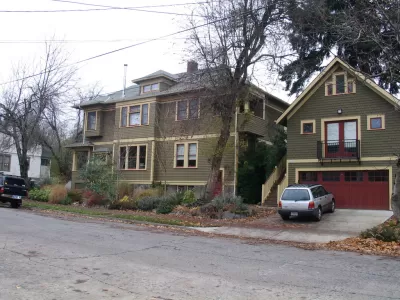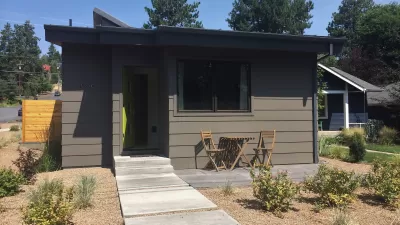Proponents of a new Accessory Dwelling Unit rule in Seattle say the tactics of opponents backfired with this Environmental Impact Study.

Dan Bertolet reports from Seattle, where the city recently released a highly anticipated Environmental Impact Study (EIS) on a proposed rule change that would allow for more construction of Accessory Dwelling Units in Seattle's residential neighborhoods.
According to Bertolet, the study was provoked by an appeal by anti-development activists led by Marty Kaplan. Bertolet provides a scathing critique of Kaplan's obstructionist positions in an earlier post from April 2017.
Now the environmental study responds to the appeal, and Bertolet says it reveals the appeal as "bunk": "baseless claims eviscerated by analysis and evidence." As an example, see here Bertolet's analysis of concerns about displacement:
The appeal’s most grievous complaint was that making it easier to build accessory dwelling units (ADUs) would lead to displacement in lower-income communities of color. In other words, poor people would lose homes to rich speculators.
The appeal’s most grievous complaint was that making it easier to build accessory dwelling units (ADUs) would lead to displacement in lower-income communities of color. In other words, poor people would lose homes to rich speculators. As the appeal’s de-facto leader, Marty Kaplan, warned: “There would be a feeding frenzy for anybody with a truck and a nail bag to go buy homes and convert them into three rental units and displace the population.”
Math begs to differ. The EIS finds that relaxing ADU rules would lead to fewer teardowns of existing single-family houses—which would decrease the likelihood of renter displacement—and that teardowns are less likely in lower-priced neighborhoods to begin with. It also demonstrates that in Seattle the value of selling a house, with or without ADUs, eclipses the value derived from renting. So much for any rental conversion “feeding frenzy.”
Bertolet also analyzes the study's findings regarding parking, before pointing a finger at the enabler for the study's delay: the Washington State Environmental Policy Act (SEPA). A lot more analysis of the study follows. If you're looking for more, there's also another article along the same lines written earlier in the week by Erica Barnett.
FULL STORY: SEATTLE’S NEW ENVIRONMENTAL STUDY ON ACCESSORY DWELLINGS OBLITERATES OBSTRUCTIONISTS’ CLAIMS

Alabama: Trump Terminates Settlements for Black Communities Harmed By Raw Sewage
Trump deemed the landmark civil rights agreement “illegal DEI and environmental justice policy.”

Study: Maui’s Plan to Convert Vacation Rentals to Long-Term Housing Could Cause Nearly $1 Billion Economic Loss
The plan would reduce visitor accommodation by 25% resulting in 1,900 jobs lost.

Planetizen Federal Action Tracker
A weekly monitor of how Trump’s orders and actions are impacting planners and planning in America.

Grand Rapids Mayor Proposes Garage Conversion Plan
The mayor says allowing homeowners to convert garages to dwelling units could alleviate the city’s housing shortage.

Baltimore Ordered to Improve Sidewalk Accessibility
The city is one of many to face lawsuits for failing to comply with the Americans with Disabilities Act.

This Toronto Suburb Has More Bus Riders Than Columbus, Ohio
Brampton, Ontario used gradual improvements in service to prove that if you build it, they will ride.
Urban Design for Planners 1: Software Tools
This six-course series explores essential urban design concepts using open source software and equips planners with the tools they need to participate fully in the urban design process.
Planning for Universal Design
Learn the tools for implementing Universal Design in planning regulations.
Smith Gee Studio
Alamo Area Metropolitan Planning Organization
City of Santa Clarita
Institute for Housing and Urban Development Studies (IHS)
City of Grandview
Harvard GSD Executive Education
Toledo-Lucas County Plan Commissions
Salt Lake City
NYU Wagner Graduate School of Public Service





























